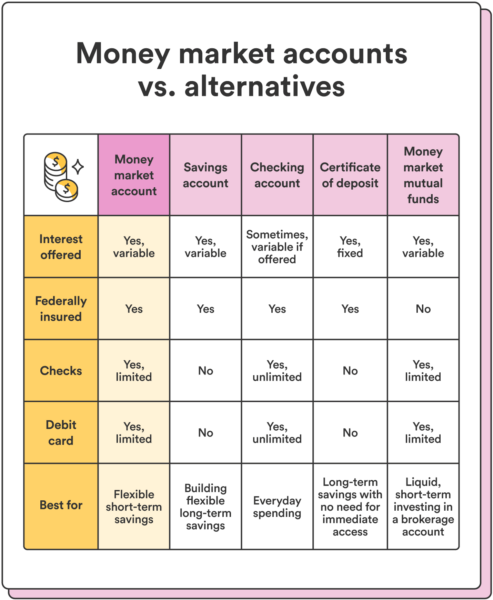
To economize, there are numerous account sorts to select from, every with its benefits and downsides.
Right here’s a more in-depth take a look at how cash market accounts examine to different frequent forms of financial savings accounts, like conventional financial savings and checking accounts, certificates of deposit (CDs), and cash market funds.
Cash market account vs. saving accounts
Cash market accounts and conventional financial savings accounts are frequent forms of deposit accounts banks and credit score unions supply. One of many key variations between them comes all the way down to rates of interest.
MMAs usually supply barely greater rates of interest than conventional financial savings accounts (though this varies relying on the present state of the financial system since MMA rates of interest rise and fall with inflation). Nonetheless, in addition they are inclined to require greater a minimal stability. In distinction, conventional financial savings accounts typically have decrease minimal stability necessities, if any.
Some MMAs may cost month-to-month charges in case your stability falls beneath the minimal requirement. For those who’re hoping to earn extra in curiosity with out paying the upper minimal stability of an MMA, you would possibly think about a high-yield financial savings account as an alternative. HYSA’s are one other nice strategy to earn way more in curiosity than conventional financial savings accounts for a a lot decrease minimal stability.
Cash market account vs. checking accounts
Whereas most cash market accounts include check-writing privileges (and generally even a debit card) like a daily checking account, they aren’t designed so that you can use for day-to-day spending. MMAs usually prohibit the variety of transactions you may make monthly, whereas checking accounts usually supply limitless transactions.
Whereas the federal mandate limiting MMA withdrawals to 6 monthly was lifted in 2020, many banks nonetheless impose this restrict. 1 That is the place the principle distinction between MMAs and checking accounts lies. Whereas checking accounts are designed for on a regular basis spending, MMAs purpose to be financial savings accounts with restricted entry to your funds.
Cash market account vs. CDs
A certificates of deposit (CD) is a financial savings account that pays a hard and fast rate of interest over a set time period, with a penalty for withdrawing the funds earlier than the time period ends.
CDs are long-term financial savings autos with set phrases and penalties for early withdrawals. This implies cash in a CD is much less liquid (that’s, much less available) than cash in an MMA.
CDs additionally usually require the next minimal deposit than MMAs, however in alternate for that greater deposit, you might be able to earn the next rate of interest. CDs additionally supply a hard and fast fee of return for the time period, whereas MMAs usually have variable charges that may change over time.
Chime tip: For those who’re in search of a long-term financial savings choice and don’t want speedy entry to your funds, a CD could also be a sensible selection. Nonetheless, think about an MMA in order for you a extra versatile financial savings choice with a aggressive rate of interest.
Cash market account vs. cash market mutual funds
Cash market accounts and cash market mutual funds (MMFs) are two totally different monetary merchandise that always get confused with one another. Not like MMAs, cash market funds aren’t provided at banks and credit score unions. As an alternative, they’re provided by mutual fund firms and funding brokerage companies.
Whereas an MMA is a federally insured interest-bearing account, cash market funds are mutual funds that put money into short-term debt securities. Not like MMAs, they aren’t FDIC-insured and should not deposit accounts however funding autos that help you earn a return in your money.
MMFs are barely higher-risk investments as a result of they aren’t FDIC-insured and topic to fluctuations available in the market. Whereas nonetheless thought-about a comparatively protected funding, they carry some threat since returns aren’t assured.


